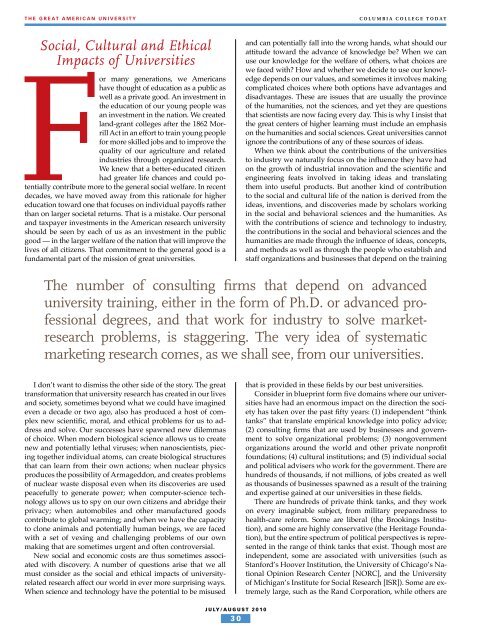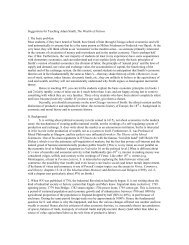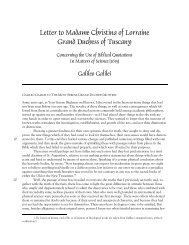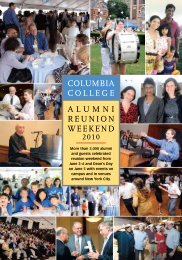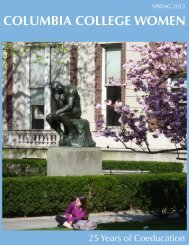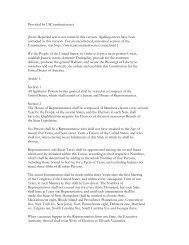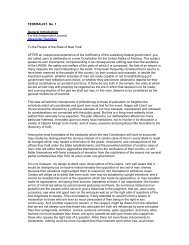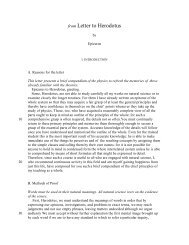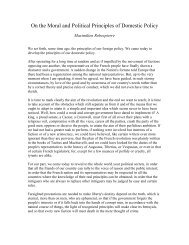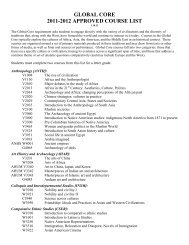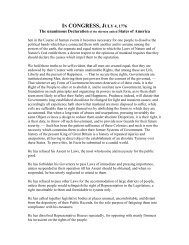Congratulations, Class of 2010! - Columbia College - Columbia ...
Congratulations, Class of 2010! - Columbia College - Columbia ...
Congratulations, Class of 2010! - Columbia College - Columbia ...
Create successful ePaper yourself
Turn your PDF publications into a flip-book with our unique Google optimized e-Paper software.
the great american university<br />
columbia college today<br />
Social, Cultural and Ethical<br />
Impacts <strong>of</strong> Universities<br />
For many generations, we Americans<br />
have thought <strong>of</strong> education as a public as<br />
well as a private good. An investment in<br />
the education <strong>of</strong> our young people was<br />
an investment in the nation. We created<br />
land-grant colleges after the 1862 Morrill<br />
Act in an effort to train young people<br />
for more skilled jobs and to improve the<br />
quality <strong>of</strong> our agriculture and related<br />
industries through organized research.<br />
We knew that a better-educated citizen<br />
had greater life chances and could potentially<br />
contribute more to the general social welfare. In recent<br />
decades, we have moved away from this rationale for higher<br />
education toward one that focuses on individual pay<strong>of</strong>fs rather<br />
than on larger societal returns. That is a mistake. Our personal<br />
and taxpayer investments in the American research university<br />
should be seen by each <strong>of</strong> us as an investment in the public<br />
good — in the larger welfare <strong>of</strong> the nation that will improve the<br />
lives <strong>of</strong> all citizens. That commitment to the general good is a<br />
fundamental part <strong>of</strong> the mission <strong>of</strong> great universities.<br />
and can potentially fall into the wrong hands, what should our<br />
attitude toward the advance <strong>of</strong> knowledge be When we can<br />
use our knowledge for the welfare <strong>of</strong> others, what choices are<br />
we faced with How and whether we decide to use our knowledge<br />
depends on our values, and sometimes it involves making<br />
complicated choices where both options have advantages and<br />
disadvantages. These are issues that are usually the province<br />
<strong>of</strong> the humanities, not the sciences, and yet they are questions<br />
that scientists are now facing every day. This is why I insist that<br />
the great centers <strong>of</strong> higher learning must include an emphasis<br />
on the humanities and social sciences. Great universities cannot<br />
ignore the contributions <strong>of</strong> any <strong>of</strong> these sources <strong>of</strong> ideas.<br />
When we think about the contributions <strong>of</strong> the universities<br />
to industry we naturally focus on the influence they have had<br />
on the growth <strong>of</strong> industrial innovation and the scientific and<br />
engineering feats involved in taking ideas and translating<br />
them into useful products. But another kind <strong>of</strong> contribution<br />
to the social and cultural life <strong>of</strong> the nation is derived from the<br />
ideas, inventions, and discoveries made by scholars working<br />
in the social and behavioral sciences and the humanities. As<br />
with the contributions <strong>of</strong> science and technology to industry,<br />
the contributions in the social and behavioral sciences and the<br />
humanities are made through the influence <strong>of</strong> ideas, concepts,<br />
and methods as well as through the people who establish and<br />
staff organizations and businesses that depend on the training<br />
The number <strong>of</strong> consulting firms that depend on advanced<br />
university training, either in the form <strong>of</strong> Ph.D. or advanced pr<strong>of</strong>essional<br />
degrees, and that work for industry to solve marketresearch<br />
problems, is staggering. The very idea <strong>of</strong> systematic<br />
marketing research comes, as we shall see, from our universities.<br />
I don’t want to dismiss the other side <strong>of</strong> the story. The great<br />
transformation that university research has created in our lives<br />
and society, sometimes beyond what we could have imagined<br />
even a decade or two ago, also has produced a host <strong>of</strong> complex<br />
new scientific, moral, and ethical problems for us to address<br />
and solve. Our successes have spawned new dilemmas<br />
<strong>of</strong> choice. When modern biological science allows us to create<br />
new and potentially lethal viruses; when nanoscientists, piecing<br />
together individual atoms, can create biological structures<br />
that can learn from their own actions; when nuclear physics<br />
produces the possibility <strong>of</strong> Armageddon, and creates problems<br />
<strong>of</strong> nuclear waste disposal even when its discoveries are used<br />
peacefully to generate power; when computer-science technology<br />
allows us to spy on our own citizens and abridge their<br />
privacy; when automobiles and other manufactured goods<br />
contribute to global warming; and when we have the capacity<br />
to clone animals and potentially human beings, we are faced<br />
with a set <strong>of</strong> vexing and challenging problems <strong>of</strong> our own<br />
making that are sometimes urgent and <strong>of</strong>ten controversial.<br />
New social and economic costs are thus sometimes associated<br />
with discovery. A number <strong>of</strong> questions arise that we all<br />
must consider as the social and ethical impacts <strong>of</strong> universityrelated<br />
research affect our world in ever more surprising ways.<br />
When science and technology have the potential to be misused<br />
that is provided in these fields by our best universities.<br />
Consider in blueprint form five domains where our universities<br />
have had an enormous impact on the direction the society<br />
has taken over the past fifty years: (1) independent “think<br />
tanks” that translate empirical knowledge into policy advice;<br />
(2) consulting firms that are used by businesses and government<br />
to solve organizational problems; (3) nongovernment<br />
organizations around the world and other private nonpr<strong>of</strong>it<br />
foundations; (4) cultural institutions; and (5) individual social<br />
and political advisers who work for the government. There are<br />
hundreds <strong>of</strong> thousands, if not millions, <strong>of</strong> jobs created as well<br />
as thousands <strong>of</strong> businesses spawned as a result <strong>of</strong> the training<br />
and expertise gained at our universities in these fields.<br />
There are hundreds <strong>of</strong> private think tanks, and they work<br />
on every imaginable subject, from military preparedness to<br />
health-care reform. Some are liberal (the Brookings Institution),<br />
and some are highly conservative (the Heritage Foundation),<br />
but the entire spectrum <strong>of</strong> political perspectives is represented<br />
in the range <strong>of</strong> think tanks that exist. Though most are<br />
independent, some are associated with universities (such as<br />
Stanford’s Hoover Institution, the University <strong>of</strong> Chicago’s National<br />
Opinion Research Center [NORC], and the University<br />
<strong>of</strong> Michigan’s Institute for Social Research [ISR]). Some are extremely<br />
large, such as the Rand Corporation, while others are<br />
july/august <strong>2010</strong><br />
30


